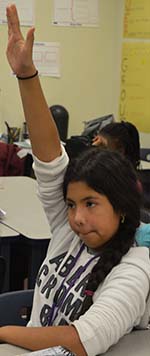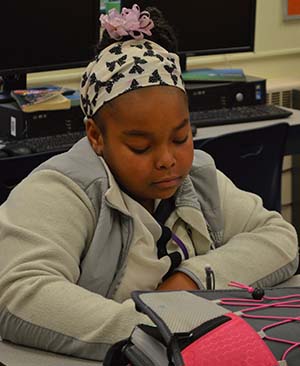Godwin Heights Middle School sixth-grader Sena Gonzalez noticed something good among her classmates last year. They took the time to understand each other.
Students were supportive. They felt safe and open about their feelings.
“Positivity was all over the school,” Sena said. “It was nice to know we could trust our peers.”
Students posted sticky notes with messages on each other’s lockers that said things like, “You’re important” and “You’re great.” It became easy to talk to one another about how they were doing and what was going on in their lives, she said.
That feeling of togetherness continues this year as students embark on a new school year using TrueSuccess, a character-building program. It was implemented in Godwin Heights as a result of the work of longtime sixth-grade teacher Austin Riebel, who saw the need to get to know students and the issues going on in their lives.
Riebel left his teaching job to work full-time as an implementation specialist at TrueSuccess, a Grand Rapids-based nonprofit that focuses on building character. He used the program in his own sixth-grade class for four years. It is being used district-wide for the first time this year.
Riebel continues to mentor Godwin Middle students using the TrueSuccess model.
“It has everything to do with the impact it has on the classroom culture,” he said, noting that carries over to school culture and then district culture.
Through lessons and videos that show real-life situations, students explore topics of respect, wisdom, thankfulness, self-control, perseverance, responsibility, encouragement, caring and integrity. They consider how these traits can apply to their own lives during discussion and literacy-based activities.
Sena feels the impact of the program throughout the school day. “Here, no one is going to judge you for what’s going on in your life,” she said.

Thinking About Behavior, Developing Compassion
TrueSuccess was founded by Bill Heneveld, an engineering consultant who became passionate about equipping kids with positive behavior skills to make wise choices for their best life. He wanted it to serve as a counter-force to the many negative influences children face.
Riebel, a basketball coach at Forest Hills Central High School, first used the model at basketball camp. He eventually began collaborating with Heneveld to bring it into the classroom. TrueSuccess was designated a nonprofit organization in 2006 and the program has been distributed to well over 80,000 kids in grades K-12.
It was used at Godwin Heights Middle School, in a high-poverty district, over a three-year period from 2011-2013. Students showed double-digit percentage growth in reading and writing on state tests, as well as gains across all other content areas.
The school was recognized this year for beating the odds, considering the socioeconomic background of its students, by being named a state Reward School and an Academic State Champ by Bridge Magazine.
“TrueSuccess created a culture change that led to significant academic improvement,” said former Principal Jeff Johnson, now superintendent of Montague Area Schools.
North Godwin Elementary School teachers also have seen good results.
“It’s building the class environment, the atmosphere, the relationship when you are talking about these things,” said fourth-grade teacher Lisa Koeman, who began using the program in her class last year.
“You open up their world,” she added. “They are very free. The kids cry. They will get very emotional. It’s touching on the kids’ hearts and our hearts.”

‘What’s Your Backstory?’
Teachers start the school day with TrueSuccess lessons. Students watch the videos, then complete literacy exercises and consider the trait of the month in their own lives.
In teacher Renae Hackley’s sixth-grade room, students recently focused on respect and how it relates to bullying. They watched a video about a student who is bullied for playing the guitar. Later, his classmates see him playing music on the street to raise money for his mother, who is dying of cancer.
Hackley asked students to consider both the effect bullying has on people and why people do it. She challenged them to open up, and to write on a piece of paper only she would see that reveals something about themselves: their backstory.
“If you could tell somebody something about yourself so they would understand you more, what would it be?” Hackley asked. She offered multiple possibilities:
“Maybe you have to wear the same clothes a couple times a week. Maybe you’re late to school often. Maybe you don’t eat breakfast every day. Maybe you have a relative who’s struggling at home. Maybe there’s a lot of yelling at home so when you get to school you want attention, so you choose to act out and yell.”
Write something you don’t dare tell people because you worry they will make fun of you, she encouraged them, adding, “Maybe if they knew they would understand you more.”
CONNECT









